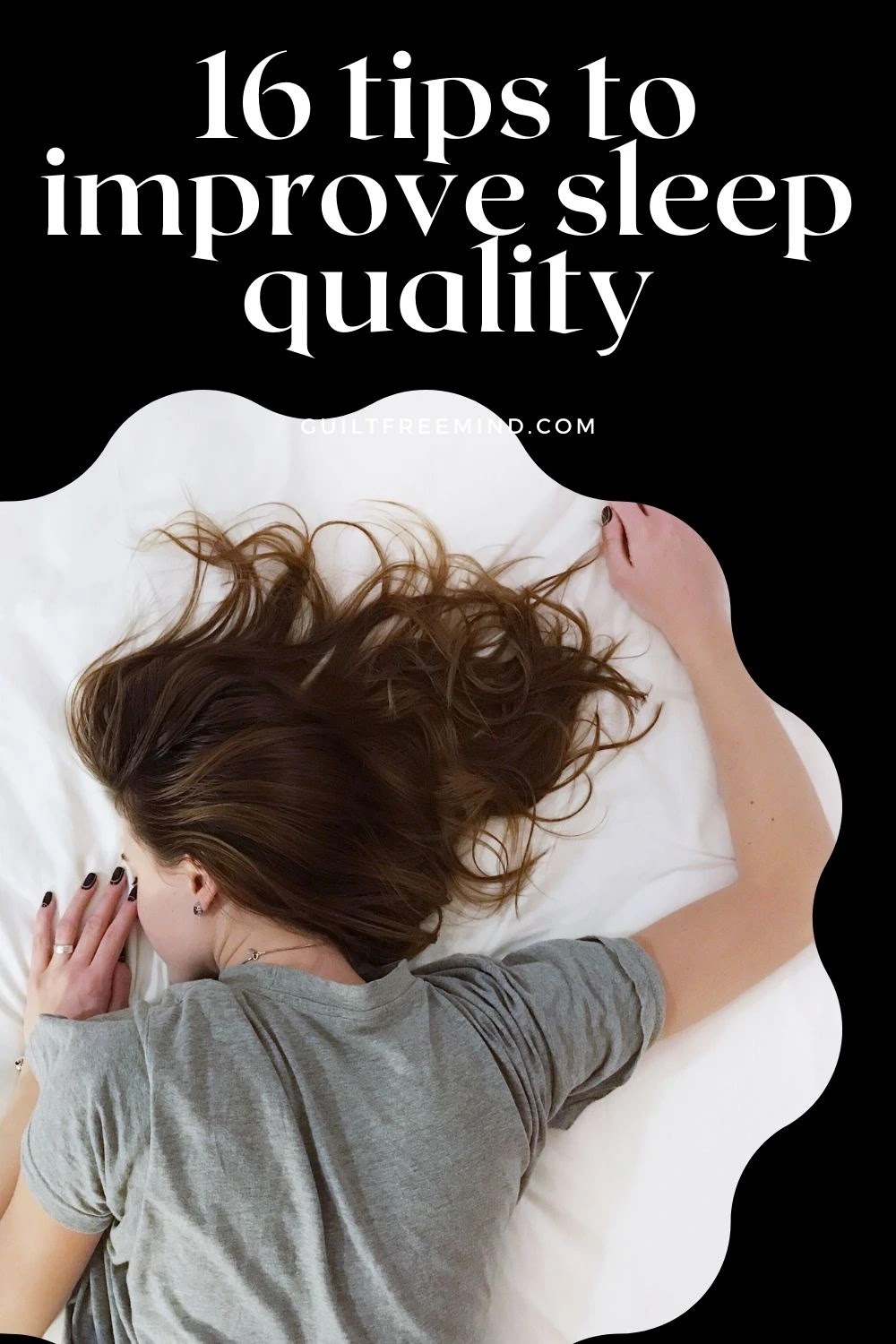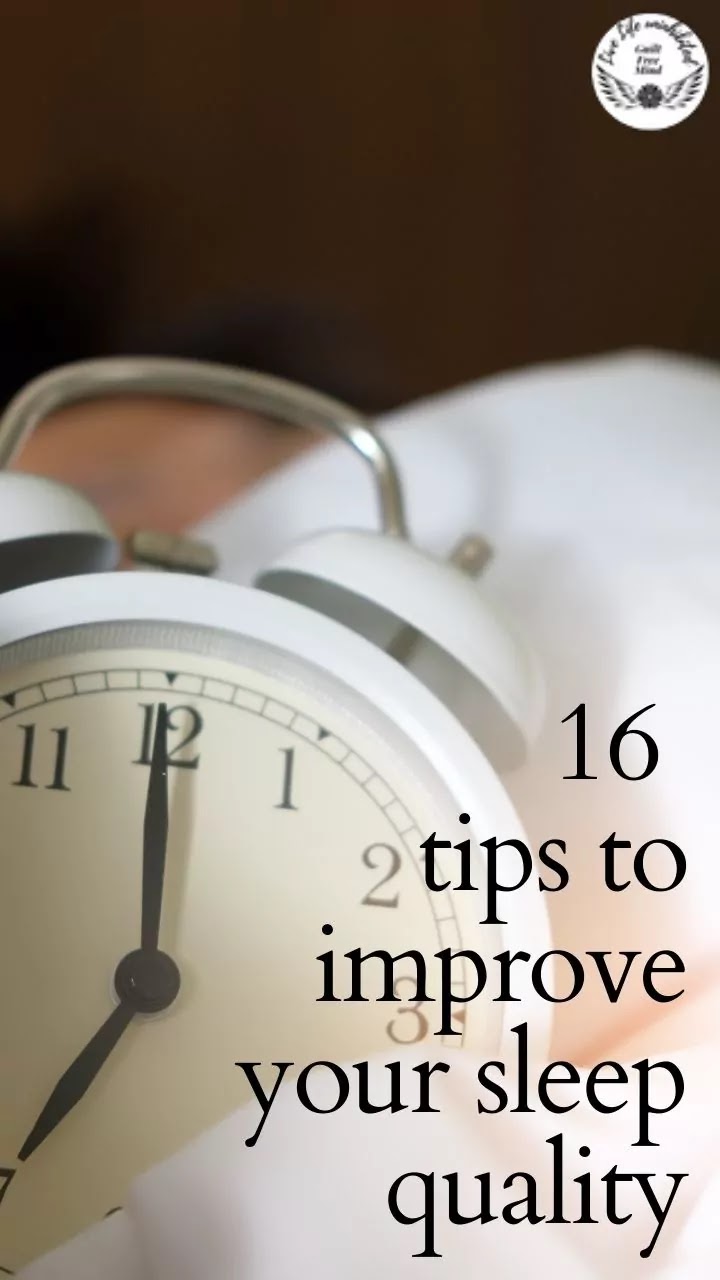Having a good night's sleep is equally important as exercising regularly and maintaining a healthy diet.
Research has shown that people who have poor sleep quality suffer negative effects on their hormones, brain function, and exercise performance. Lack of sleep can also cause an increased risk of diseases and weight gain in children and adults. In contrast, if you get a good night's sleep, you will eat less, be healthier, exercise better, and deal with the everyday stressors more efficiently. In the last few decades, sleep quality and quantity have declined severely. Most people are used to getting a poor level of sleep on an everyday basis. If you wish to optimize your mental or physical health or focus on losing extra weight, sound sleep should be the first thing on your To-Do List. In this article, I will be discussing 16 tips that have scientific evidence is backing them up on how to improve sleep quality.
I hope you
have enjoyed reading the article so far. Do not forget to subscribe to Guilt
Free Mind so that I can send you regular updates regarding the release of new
articles directly in your inbox.
Pin this article for later
 |
| Pin it! |
Tips to improve sleep quality
1.Increase exposure to bright light during daytime
Our bodies
have a natural functioning time-ticking clock that is referred to as circadian
rhythm. Circadian rhythm has been known to affect hormones, the body, and the
brain. It tells your body when it should stay awake and when it should sleep.
During the day, the availability of bright light and natural sunlight helps
regulate the circadian rhythm and keep it healthy. This improves your day
wakefulness and nighttime sleep duration, and quality. However, people who have
insomnia find it difficult to fall asleep.
Studies
have shown that if such people are exposed to more daytime bright light, it
reduces the time needed to drift off to sleep. Another study found that if
older adults received at least two hours of exposure to bright light during the
daytime, it improved sleep quality by 80%. Even though most of this
research is centered around sleep disorders, a good daylight exposure will help
you if you experience average sleep, wake up quickly, or struggle to fall
asleep. If it is hard for you to get daily sunlight exposure or is not a
practical option, you can invest in bulbs or artificial bright light.
2. Reduce exposure to blue light in the evening time
Exposure
to light during the day is very good, but exposure to light at night can have
the opposite effect. This primarily happens due to the effect on the circadian
rhythm. If the body gets exposed o light during the nighttime, the circadian
rhythm tricks the brain to think that it is still morning. This reduces the
melatonin hormone production which is responsible for relaxing your body and
improves sleep quality. Blue light is normally emitted from devices like
computers and smartphones in humongous amounts, thus degrading your sleep quality.
Methods to reduce exposure to blue light at night time
- Wear blue light blocking glasses
- Download apps to block blue light emission from your computer or laptop
- Install apps to block blue light emission on your smartphone
- Stop watching TV two hours before you go to bed.
Related articles:
6 types of anxiety disorders , a complete guide
Treating anxiety disorders naturally: 22 tips to follow
How to cope with depression naturally?
3. Do not consume caffeine late in the evening.
Caffeine has enormous benefits when it comes to the human body. It is currently consumed by at least 90% of the US population on an everyday basis. A single dose of black coffee can enhance your energy, focus, and sports performance. However, if you tend to consume caffeine late in the day, it can cause stimulation of the nervous system and reduce the natural relaxation of your body at night. One study was conducted in which caffeine was provided to the participant 6 hours before bedtime. It was observed to worsen the sleep quality significantly.
The
levels of caffeine in the blood stay high for a period of 6 to 8 hours.
Therefore, if you drink large amounts of coffee after 3.00-4:00 PM, you will
have trouble sleeping, especially if you are a caffeine-sensitive person. If
you want to have a cup of java during the late afternoon, go with a
decaffeinated one.
4. Reduce the habit of long daytime naps
Power naps
can be very beneficial for the body. However, irregular or long naps can have
the opposite effect. Daytime sleeping confuses the internal clock of the body,
which leads to sleep struggles. It has been noted that 30 minutes or fewer
duration naps during the daytime can enhance brain function. However, longer
naps can cause harm to both sleep quality and health. When participants slept
during the day, they felt sleepier.
There is a
contradictory theory to this as well. Those used to taking daytime naps do not
experience worse sleep quality or disrupted sleep during the nighttime. Thus,
if you are a regular daytime napper and sleep well at night, there is nothing
to worry about.
5. Sleep and wake consistently
The circadian rhythm of the body is time-dependent, as per the sunrise and sunset. Thus, if you allow your sleep and waking time to be consistent on an everyday basis, it can be crucial for improving sleep quality. Those who have an irregular sleeping pattern and choose to go to bed late during weekends have reported poor sleep quality. Irregular sleeping patterns can also cause alteration of the circadian rhythms and irregular melatonin production, which would, in turn, lead to an irregular sleep cycle.
 |
| Tips to improve sleep quality |
6. Melatonin supplement
Melatonin
is a sleep hormone/ Melatonin supplements are one of the most popular sleep
supplements. These are often used for insomnia treatment. Studies have observed
that ingesting 2 grams of melatonin before bedtime improves sleep. Some
countries require a prescription to obtain melatonin, while in others,
melatonin is easily available online or in stores. If you are thinking of using
melatonin to aid sleep, have a discussion with your physician.
7. Reduce alcohol consumption
If you
drink at night, it can negatively affect your hormones and sleep. Alcohol has
been observed to increase symptoms of snoring, disrupted sleep patterns, and
apnea. It also causes alteration in melatonin production, which is a key
regulator of the circadian rhythm.
8. Optimize the bedroom
Many
people believe that the environment of the bedroom can affect sleep quality and
patterns. These factors include external lights for furniture arrangement,
noise, and temperature. Studies have pointed out that if there is the presence
of external noise, specifically that from traffic, it can lead to poor sleep
quality and long-term health issues. When lights were dimmed and noises were
reduced, the sleep quality improved.
9. Make sure the bedroom temperature is ambient.
Bedroom
and body temperature profoundly affect sleep quality. You may have noticed that
it is hard to fall asleep when it is too warm. Temperature affects sleep more
than noise. Increased bedroom and body temperature reduces sleep quality and
increases wakefulness in the person. In most cases, 70 degrees Fahrenheit is a
comfortable temperature, although it may differ depending on your habits and
preferences.
10. Do not eat late in the evening.
Late-night
snacks and having dinner late can have a huge negative impact on the sleep
quality and natural release of melatonin. Try to make sure that you have your
dinner at least 4 hours before bedtime and not indulge in midnight snacking
habits.
11. Focus on relaxation techniques in the evening
Having a
pre-sleep routine can be good for improving your sleep quality. Indulging in
relaxation techniques before bedtime has been observed to improve sleep quality. This is a common technique to reduce insomnia. The techniques
you can use to relax are:
- Listening to relaxing music
- Taking a hot bath
- Visualization
- Deep breathing
- Meditating
- Indulging in a relaxing body massage
You can
try out different methods and do figure out what works best for your body.
Related articles:
Combat everyday stress: 25 brilliant strategies
16 signs you are in a toxic relationship and what to do
12. Relaxing shower or bath
Relaxing
shower or bath is another common manner to improve sleep quality. Studies had
shown that having a bath 90 minutes before bedtime helped improve sleep quality
and allowed for a deeper sleep. If you do not wish to take a complete bath at
night, you should bathe your feet in hot water. This can also have a positive
effect.
13. Rule out sleep disorders
If you
have any underlying medical issue, it may be the root cause of your sleep
issues. One common problem people face is sleep apnea. This leads to
interrupted and inconsistent breathing. People who suffer from this problem
tend to stop breathing when they are sleeping. It has been observed that 9% of
women and 24% of men suffer from sleep apnea. If you have been struggling with
sleep patterns for a long time, consult your physician.
 |
| A good sleep improves mental health |
14. Get a comfortable mattress, bed, and pillow.
The bed
quality has a huge impact on one's sleep patterns. If you have a poor quality
of bedding, it can lead to an increase in lower back pain and reduce your sleep
quality. The bedding and mattress are extremely subjective and may vary
depending on your preferences. If you are thinking of upgrading your bedding,
base your choices on your personal preference. Bedding up-gradation is
recommended every five to eight years period if you have not replaced your
bedding for many years now; this may be all that is needed to improve sleep quality.
15. Regular exercise
This point
cannot be emphasized enough. Exercises are crucial in the regulation of one's
mental and physical health. People who have insomnia have observed that
exercising helps them improve sleep quality more than drugs. Exercises have been observed to reduce
the time needed to fall asleep by 55%. Exercise also reduces anxiety by 15%,
night wakefulness by 30%, and increases sleep time by 18%. However, exercise
must be performed early in the day to have the right kind of effect. If
exercise is conducted late in the daytime, it will increase alertness and cause
the production of hormones like adrenaline and epinephrine, which increase
wakefulness.
16. Avoid drinking liquids before bed.
If you
have to get up to urinate multiple times, your sleep quality will be hampered.
Therefore, avoid drinking large quantities of liquid just before bedtime.
Hydration is essential, but it should not be done right before sleep time. You
have the entire day to complete your quota of liquids.
Conclusion
The primary point here is that sleep is crucial for your mental and physical health. Insufficient sleep increases anxiety, allergies, health issues, and obesity. You must focus on getting at least 7 to 8 hours of sleep every night. Those who sleep for less than 7 hours face increased risks of developing type 2 diabetes, heart diseases, anxiety, and other mental health issues. Follow the above mentioned tips to improve sleep quality and reduce mental health issues.
If you wish to be notified about the new articles as and when they are released, please subscribe to the Guilt Free Mind blog newsletter so I can keep you in the loop about the latest article releases.
See you in my next blog post
Shruti



